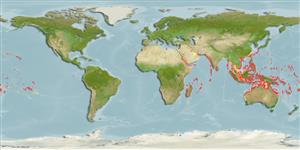Common names from other countries
>
Holocentriformes (Squirrelfishes, soldierfishes) >
Holocentridae (Squirrelfishes, soldierfishes) > Holocentrinae
Etymology: Neoniphon: Greek, neos = new + Greek, niphon = to snow (Ref. 45335).
Environment: milieu / climate zone / depth range / distribution range
Sinh thái học
Biển Cùng sống ở rạn san hô; Mức độ sâu 0 - 46 m (Ref. 9710). Tropical; 30°N - 32°S, 31°E - 123°W
Indo-Pacific: Red Sea and East Africa to the Marquesan and Ducie islands, north to southern Japan, the Ogasawara and Hawaiian islands, south to northern Australia and Lord Howe Island.
Length at first maturity / Bộ gần gũi / Khối lượng (Trọng lượng) / Age
Maturity: Lm 15.0 range ? - ? cm
Max length : 32.0 cm TL con đực/không giới tính; (Ref. 9710); common length : 23.0 cm TL con đực/không giới tính; (Ref. 9948)
Các tia vây lưng cứng (tổng cộng) : 11; Các vây lưng mềm (tổng cộng) : 11 - 13; Tia cứng vây hậu môn: 4; Tia mềm vây hậu môn: 7 - 8. Pinkish silvery above, silvery below; a dark red to black spot on each scale. Reddish stripe along LL (Ref. 4201). Outer margin of caudal lobes and anterior soft rays of dorsal and anal fins reddish; pectoral fins pale pink, pelvic fins white (Ref. 4201).
This schooling species inhabits seagrass beds and hard-bottomed habitats from the reef flat to depths of 46 m or more on lagoon and seaward reefs. Often found with branching Acropora coral (Ref. 9710). Most common Neophion found in shallow areas (Ref. 9710). Benthopelagic (Ref. 58302). Feeds on small fishes (Ref. 30573), small crabs, and shrimps at night. Venomous spine at the corner of its preopercle. Marketed fresh (Ref. 9948). Solitary (Ref 90102).
Life cycle and mating behavior
Maturities | Sự tái sinh sản | Spawnings | Egg(s) | Fecundities | Ấu trùng
Randall, J.E. and P.C. Heemstra, 1986. Holocentridae. p. 415-427. In M.M. Smith and P.C. Heemstra (eds.) Smiths' sea fishes. Springer-Verlag, Berlin. (Ref. 4201)
IUCN Red List Status (Ref. 130435)
CITES (Ref. 128078)
Not Evaluated
Human uses
Các nghề cá: buôn bán nhỏ; Bể nuôi cá: Tính thương mại; mồi: usually
Các công cụ
Special reports
Download XML
Các nguồn internet
Estimates based on models
Preferred temperature (Ref.
115969): 24.7 - 29, mean 27.9 (based on 954 cells).
Phylogenetic diversity index (Ref.
82804): PD
50 = 0.5312 [Uniqueness, from 0.5 = low to 2.0 = high].
Bayesian length-weight: a=0.01585 (0.01028 - 0.02444), b=3.00 (2.87 - 3.13), in cm Total Length, based on LWR estimates for this species & (Sub)family-body (Ref.
93245).
Mức dinh dưỡng (Ref.
69278): 3.6 ±0.2 se; based on diet studies.
Thích nghi nhanh (Ref.
120179): Chiêù cao, thời gian nhân đôi của chủng quần tối thiểu là dưới 15 tháng (K=0.5).
Fishing Vulnerability (Ref.
59153): Low to moderate vulnerability (26 of 100).
